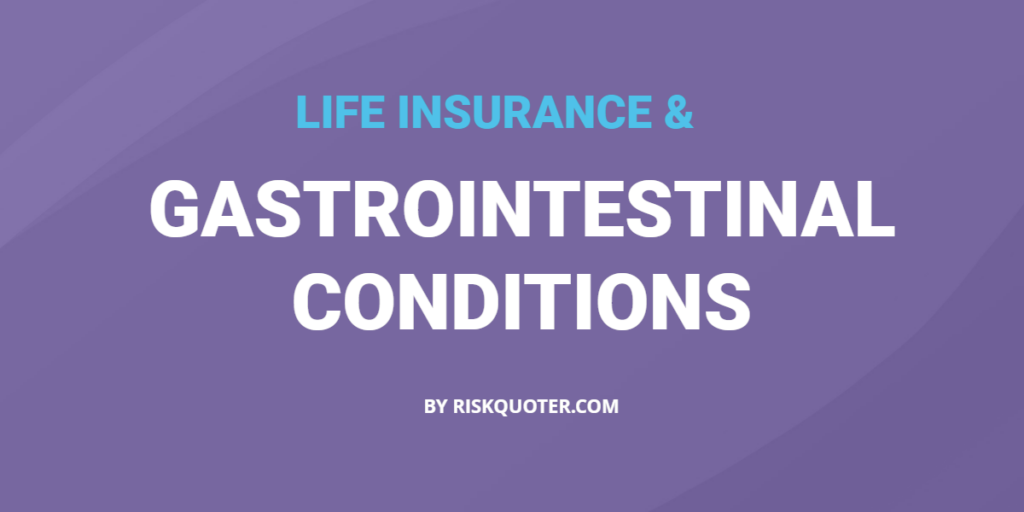Obtaining life insurance can be challenging for individuals with high-risk gastrointestinal (GI) conditions. Understanding how various GI disorders impact life insurance eligibility and premiums is crucial for securing the best possible coverage.
This guide provides an overview of common GI conditions and their implications for life insurance, with links to detailed articles on each condition.
Understanding Gastrointestinal (GI) Conditions
Gastrointestinal conditions encompass a range of disorders affecting the digestive tract, including the stomach, intestines, liver, and other associated organs. These conditions can vary in severity and may influence life insurance underwriting decisions.
Common Gi Conditions and Life Insurance Implications
Below are some prevalent GI conditions with brief descriptions and links to more in-depth information.
Inflammatory Bowel Disease (IBD) & Life Insurance
Overview: IBD primarily includes Crohn’s disease and ulcerative colitis, both characterized by chronic inflammation of the gastrointestinal tract.
- Crohn’s Disease: A condition causing inflammation anywhere along the GI tract, leading to symptoms like abdominal pain and diarrhea. Learn more about life insurance considerations for Crohn’s Disease.
- Ulcerative Colitis: Characterized by Inflammation and flare-ups in the colon and rectum, resulting in symptoms such as rectal bleeding and urgent bowel movements. Explore life insurance options for Ulcerative Colitis.
The concern underwriters have is the increased risk of developing cancer. We’ll also need to know if you have other medical conditions like heart disease or diabetes.
Elevated Liver Enzymes
Overview: Elevated liver enzymes can indicate inflammation or damage, potentially affecting life insurance eligibility. Find out how elevated liver enzymes impact life insurance.
Hepatitis
Overview: Hepatitis involves inflammation of the liver, commonly caused by viral infections, and can significantly influence life insurance underwriting. Discover life insurance considerations for individuals with Hepatitis.
Irritable Bowel Syndrome (IBS)
Overview: A GI disorder causing symptoms like abdominal pain and altered bowel habits. While typically less severe than IBD, IBS can still affect life insurance underwriting.
Gastroesophageal Reflux Disease (GERD)
Overview: A chronic condition where stomach acid frequently flows back into the esophagus, leading to symptoms like heartburn. GERD’s impact on life insurance varies based on severity and treatment.
For 90% of people with GERD, life insurance underwriting is not a problem. It’s the 10%1 of people with GERD who develop Barrett’s Esophagus.
Barrett’s Esophagus
Overview: A condition where the esophageal lining changes, often due to prolonged GERD, increasing the risk of esophageal cancer.
Barrett’s may be classified as low-grade or high-grade based on the dysplastic changes to the esophagus. Successful treatment and frequent follow-up endoscopy are the keys to successful underwriting outcomes.
Treatment may consist of medications, radiofrequency ablation, or photodynamic therapy.
Underwriting Barrett’s Esophagus
Life insurance offers depend on whether there is dysplasia or not.
Any indication of dysplasia is a decline.
If you’ve had no indication of dysplasia on endoscopy reports and medication controls your condition, obtaining a Preferred Non-Tobacco rate class with a company like John Hancock is possible.2
Low-Grade Dysplasia Underwriting
Underwriting depends on whether you’ve had treatment or are in active surveillance.
- Low Grade Ablation or Surgical Resection of Esophagus:
- 0-12 Months after treatment = Postpone
- 12+ Months & Biopsy = Standard rates if negative for dysplasia. If Barrett’s is no longer present, better rates are possible.
- Any indication of dysplasia after treatment is a decline.
- Active Surveillance
- Postpone for 24-36 months, followed by individual consideration for future coverage.
High-Grade Dysplasia Underwriting
High-grade dysplasia with no ablation or resection surgery is a decline for anything but guaranteed issue insurance.
If you’ve had surgical treatment, the postponement period is typically 24 months after completion.
An additional flat extra expense is added to your policy.
If you are not compliant with your follow-up checkups, endoscopies, etc., all companies will decline to cover you.
Diverticulitis – Underwriters assess the severity and frequency of flare-ups, complications like abscesses or perforations, and surgical history.
Celiac Disease – Generally not an issue if well-managed with a gluten-free diet.
Gall Bladder Disease
The most common condition related to your gall bladder is gallstones. You may be at risk for gallstones if you have diabetes, elevated lipids, Crohn’s disease, or other health conditions.
Gallstones do not cause underwriting problems from a life insurance underwriting standpoint if they are successfully treated with medication or surgery.
Concerns happen when gallbladder polyps are detected or bile ducts are obstructed by a gallstone, which may trigger pancreatitis, jaundice, or require surgery.
All rate classes are available after a full recovery from surgery, as long as no cancer is involved.
Pancreatitis
Pancreatitis is an infection or inflammation of your pancreas that may be acute or chronic. Acute pancreatitis that happens 1 – 2 times for unknown reasons is generally not a problem with underwriting.
The most common cause of chronic pancreatitis is alcoholism. When alcoholism is the reason for pancreatitis, life insurance is declined until the applicant has been successful with alcohol treatment.
Factors Influencing Life Insurance Decisions
When evaluating applicants with GI conditions, life insurance companies consider several factors:
- Diagnosis Specifics: The exact nature and name of the GI condition.
- Severity and Control: How severe the condition is and how well it is managed with treatment.
- Treatment Compliance: Adherence to prescribed medications and regular medical follow-ups.
- Complications: Any additional health issues arising from the primary GI condition.
- Time Since Diagnosis or Last Episode: The duration since diagnosis or the most recent episode.
Many of our clients contact us after they’ve been declined or received a high table-rated underwriting offer.
Final Thoughts
Navigating life insurance with a gastrointestinal condition requires understanding how your specific diagnosis affects underwriting decisions.
By staying informed and working with knowledgeable professionals, you can improve your chances of securing suitable coverage.
Remember that there is never any pressure or obligation with our service.
Please take a few minutes to submit your quote request today.
